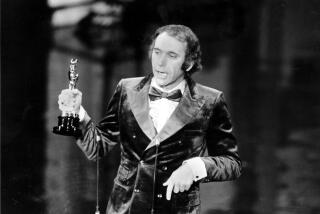William Dozier; Veteran Movie, TV Executive
- Share via
William Dozier, the film and television executive who oversaw the production of such divergent projects as TV’s “Batman” and RKO’s breakthrough “Crossfire,” the first modern movie dealing with anti-Semitism in America, is dead.
His wife, actress Ann Rutherford, said Wednesday that he was 83 when he died early Tuesday at St. John’s Medical Center in Santa Monica of respiratory complications.
A former talent agent for such writers as Erle Stanley Gardner, F. Scott Fitzgerald and Dalton Trumbo, Dozier’s entertainment career began in Hollywood’s Golden Age when he went to Paramount in 1941 as head of the story and writing department.
Three years later he joined RKO Radio Pictures and supervised the production of “Notorious,” with Cary Grant and Ingrid Bergman; “The Spiral Staircase,” with Dorothy McGuire and Robert Young, and “Crossfire.”
That landmark 1947 picture--which starred Young, Robert Ryan and Robert Mitchum--told of the murder of a Jew by a xenophobic GI.
The late Times columnist Art Seidenbaum once referred to Dozier as “having worn more titles than a silent movie” and his four-page biography does service to the description.
Dozier’s responsibilities ranged from West Coast chief of CBS to production head of Screen Gems, then the TV arm of Columbia Pictures.
He had also formed his own Greenway Productions at 20th Century Fox, which produced “Batman,” a series that he ruefully admitted brought him the most recognition and money.
Although his was the guiding hand behind such classic television shows as “Playhouse 90,” “Studio One” and the semi-documentary series “You Are There,” he had no illusions where his true fame lay.
“If I got hit by a truck, the New York Daily News would say ‘Batman Producer Killed’ while the New York Times would refer to me as the ‘Ex-Husband of Joan Fontaine (his second wife).’ ”
Actors ranging from Burgess Meredith to Cyril Ritchard, James Mason, Liberace and Nanette Fabray swamped him with calls, all wanting to be Villain of the Week on the immensely popular 1966-68 series.
They received a modest $3,500 to $4,000 for battling the Caped Crusader and Robin and Dozier said he refused to use comedians in the roles “because they’d try to be funny and would spoil the effect.”
After “Batman,” Dozier said, he began a gradual withdrawal from what he called “the business.”
The emphasis on youth bothered him, he said in 1974. “I got tired of being in a squirrel cage because I got older and the squirrels got younger.”
Dozier’s personal interests proved as wide-ranging as his credits.
He reviewed books for newspapers (including The Times), taught drama and public speaking at Mount St. Mary’s College in West Los Angeles where he also was chairman of the Board of Regents and was a former member of the Board of Governors of the Academy of Motion Picture Arts and Sciences.
But he eschewed writing his autobiography.
“If I was truthful I’d have to leave town,” he said in a 1974 interview.
Besides Miss Rutherford, he is survived by a son, Robert, a daughter, Deborah, a stepdaughter, Gloria, and seven grandchildren.
Private services will be held Friday at 10 a.m. at the Church of the Good Shepherd in Beverly Hills. In lieu of flowers the family asks donations either to Mount St. Mary’s or the Motion Picture and Television Home in Woodland Hills.
More to Read
Only good movies
Get the Indie Focus newsletter, Mark Olsen's weekly guide to the world of cinema.
You may occasionally receive promotional content from the Los Angeles Times.






